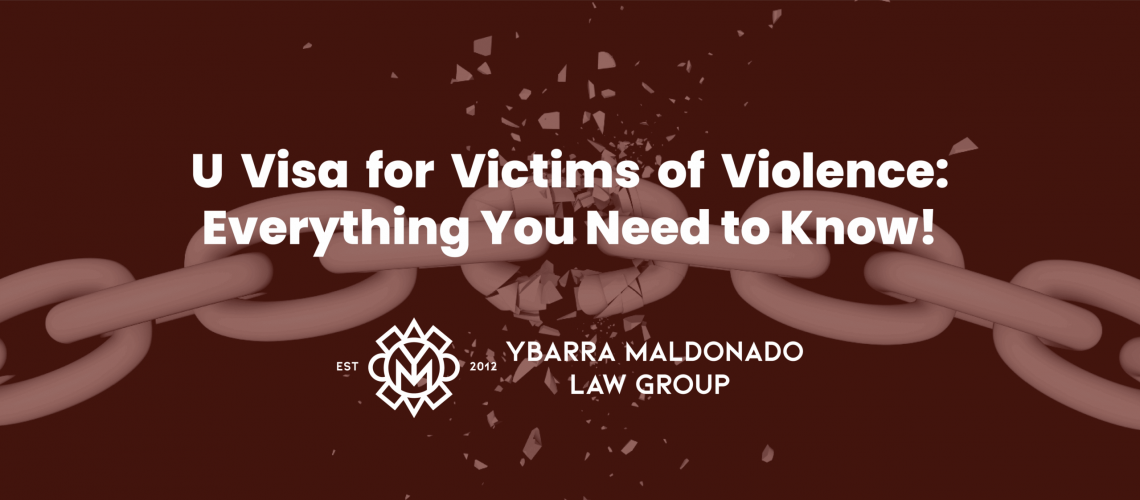The U Visa (U Nonimmigrant Visa) for Victims of Violence, is a special type of nonimmigrant visa in the United States created to protect victims of crimes who:
- Have suffered substantial physical or mental abuse as a result of the crime, and
- Are willing to cooperate with authorities (police, prosecutors, judges, etc.) in the investigation or prosecution of the crime.
Main Purpose of the U Visa for Victims of Violence
The U Visa for Victims of Violence seeks to encourage victims to report crimes and collaborate with justice without fear of being deported.
Key Requirements to Apply for U Visa for Victims of Violence
To be eligible, the person must demonstrate that they:
- Were the victim of a qualifying crime (for example: domestic violence, sexual assault, kidnapping, extortion, labor fraud, among others).
- Suffered physical or mental harm as a result of the crime.
- Possess information about the crime.
- Are willing to help or have already helped in the investigation or criminal process.
- The crime occurred in the U.S. or violated U.S. laws.
Key Certification for the U Visa (Form I-918, Supplement B)
- An essential step is obtaining a certification signed by an authority (for example, a police officer, prosecutor, judge, or government agency).
- This certification confirms that the person cooperated or is cooperating with justice.
What is the Certification for the U Visa for Victims of Violence?
It is an official document issued by a competent authority (for example, the police, a prosecutor, a judge, or a government agency) that confirms that the person was a victim of a crime and cooperated or is willing to cooperate with the investigation or criminal process.
The technical name of this document is:
👉 Form I-918, Supplement B — U Nonimmigrant Status Certification.
How Does the Process of the U Visa for Victims of Violence Work?
- The victim (or their attorney) requests the certification from the agency or department that handled the criminal case or report.
- The authority reviews whether the crime qualifies (for example: domestic violence, assault, kidnapping, sexual assault, extortion, etc.) and whether the person helped, is helping, or will help in the investigation.
- If the agency considers that the victim was cooperative, then it signs Form I-918B.
- That signed certification is valid for 6 months and must be included along with the main application (Form I-918).
What Does the U Visa Certification (Form I-918B) Include?
Form I-918B includes:
- Name and personal information of the victim.
- Type of crime.
- Description of the harm suffered.
- Level of cooperation from the victim with authorities.
- Signature of the authorized official and the date.
Essential Details You Should Know Before Applying for a U Visa for Victims of Violence
- Without the certification, USCIS cannot process an application.
- Obtaining the certification does not guarantee that USCIS will approve the visa, but it does allow the application to be submitted.
- The authority is not legally required to issue the certification; it is a discretionary decision.
- Even if the perpetrator was not arrested or convicted, the victim may still qualify if they cooperated in the investigation.
Main Benefits of of Applying for a U Visa for Victims of Violence (and What You Can Expect)
- Work permit (EAD).
- Legal status for 4 years (renewable in some cases).
- Possibility of applying for Permanent Residence (Green Card) after 3 years under the U Visa for Victims of Violence.
- Possibility of including eligible family members (spouse, children, and in some cases parents or minor siblings).
Conclusion: Why the U Visa Certification Matters for Victims of Crime?
- The Certification is like the “bridge” between the criminal case and the immigration application.
- Without that document, the case cannot move forward before USCIS.
- With it, the victim demonstrates that they helped the authorities and deserve the humanitarian protection offered by the U Visa for Victims of Violence.
- If you or someone you know was the victim of a crime and needs guidance to obtain this certification or begin the Visa process, Ybarra Maldonado Law Group can help you.
📞 Contact us to receive a confidential evaluation and the legal support you need. Call (602) 910-4040 or contact us online to schedule a free consultation with an experienced immigration attorney.
Want to learn more about immigration rights and legal updates? Visit our Youtube Channel for educational videos and insights.

